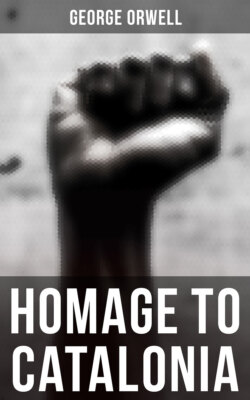Homage to Catalonia

Реклама. ООО «ЛитРес», ИНН: 7719571260.
Оглавление
George Orwell. Homage to Catalonia
Homage to Catalonia
Reading suggestions
Table of Contents
1
2
3
4
5
6
7
8
9
10
11
A TROTSKYIST REVOLT
SPANISH TROTSKYISTS PLOT WITH FRANCO
12
13
14
Отрывок из книги
George Orwell
Published by
.....
The answer was always a harassed smile and a promise that there should be machine-gun instruction mañana. Needless to say mañana never came. Several days passed and the recruits learned to march in step and spring to attention almost smartly, but if they knew which end of a rifle the bullet came out of, that was all they knew. One day an armed Carabinero strolled up to us when we were halting and allowed us to examine his rifle. It turned out that in the whole of my section no one except myself even knew how to load the rifle, much less how to take aim.
All this time I was having the usual struggles with the Spanish language. Apart from myself there was only one Englishman at the barracks, and nobody even among the officers spoke a word of French. Things were not made easier for me by the fact that when my companions spoke to one another they generally spoke in Catalan. The only way I could get along was to carry everywhere a small dictionary which I whipped out of my pocket in moments of crisis. But I would sooner be a foreigner in Spain than in most countries. How easy it is to make friends in Spain I Within a day or two there was a score of militiamen who called me by my Christian name, showed me the ropes, and overwhelmed me with hospitality. I am not writing a book of propaganda and I do not want to idealize the P.O.U.M. militia. The whole militia-system had serious faults, and the men themselves were a mixed lot, for by this time voluntary recruitment was falling off and many of the best men were already at the front or dead. There was always among us a certain percentage who were completely useless. Boys of fifteen were being brought up for enlistment by their parents, quite openly for the sake of the ten pesetas a day which was the militiaman's wage; also for the sake of the bread which the militia received in plenty and could smuggle home to their parents. But I defy anyone to be thrown as I was among the Spanish working class — I ought perhaps to say the Catalan working class, for apart from a few Aragonese and Andalusians I mixed only with Catalans — and not be struck by their essential decency; above all, their straightforwardness and generosity. A Spaniard's generosity, in the ordinary sense of the word, is at times almost embarrassing. If you ask him for a cigarette he will force the whole packet upon you. And beyond this there is generosity in a deeper sense, a real largeness of spirit, which I have met with again and again in the most unpromising circumstances. Some of the journalists and other foreigners who travelled in Spain during the war have declared that in secret the Spaniards were bitterly jealous of foreign aid. All I can say is that I never observed anything of the kind. I remember that a few days before I left the barracks a group of men returned on leave from the front. They were talking excitedly about their experiences and were full of enthusiasm for some French troops who had been next to them at Huesca. The French were very brave, they said; adding enthusiastically: ‘Más valientes que nosotros’ — ‘Braver than we are!’ Of course I demurred, whereupon they explained that the French knew more of the art of war — were more expert with bombs, machine-guns, and so forth. Yet the remark was significant. An Englishman would cut his hand off sooner than say a thing like that.
.....